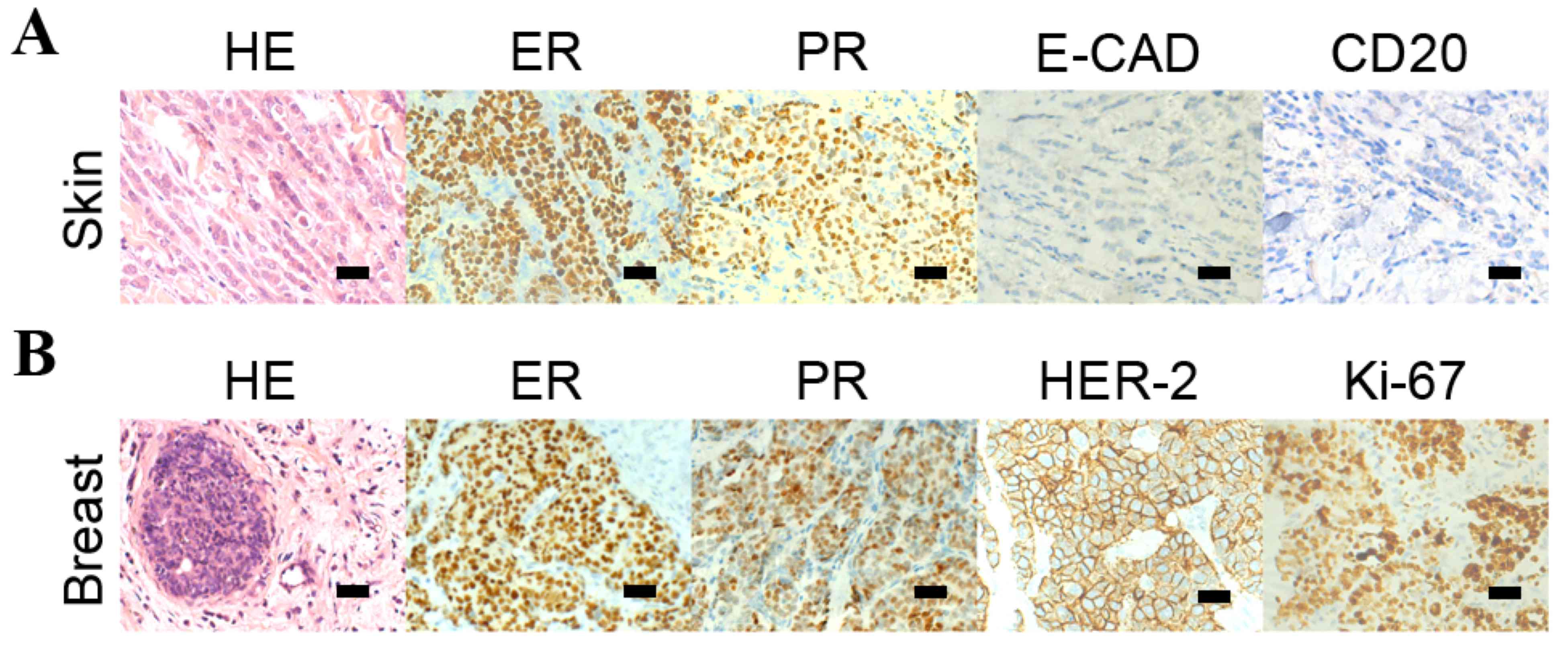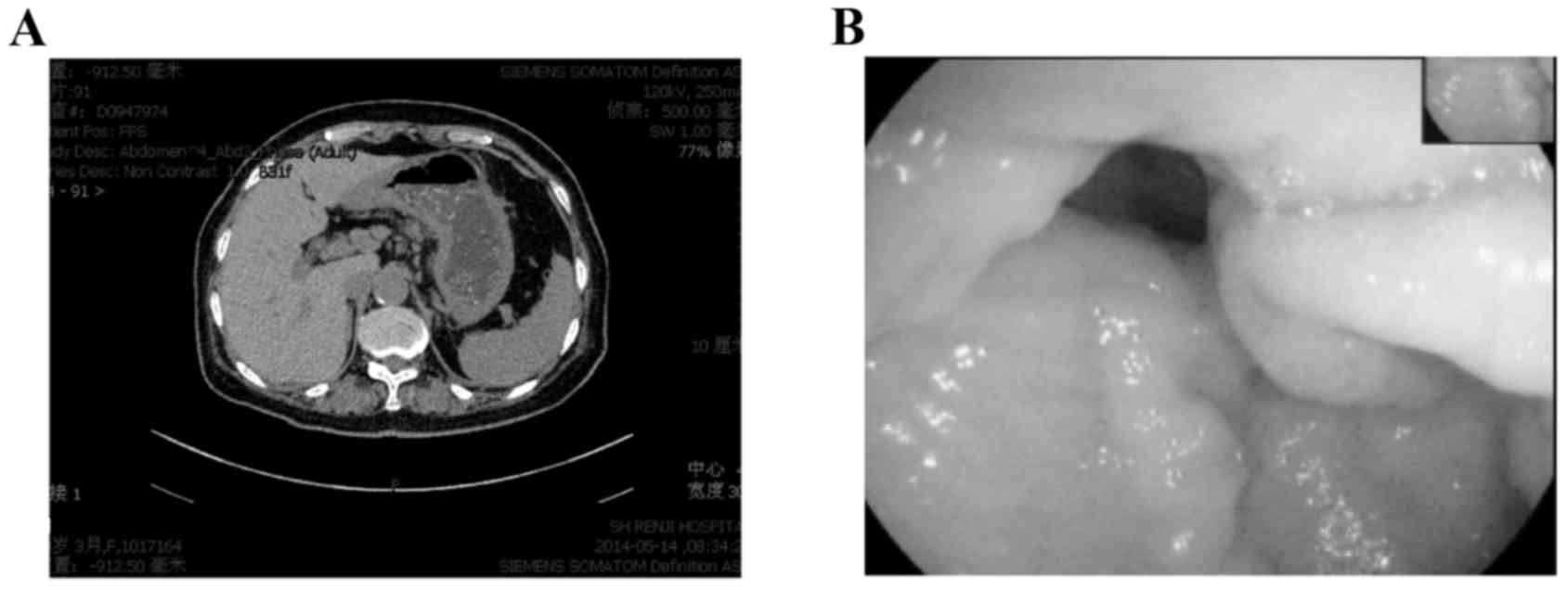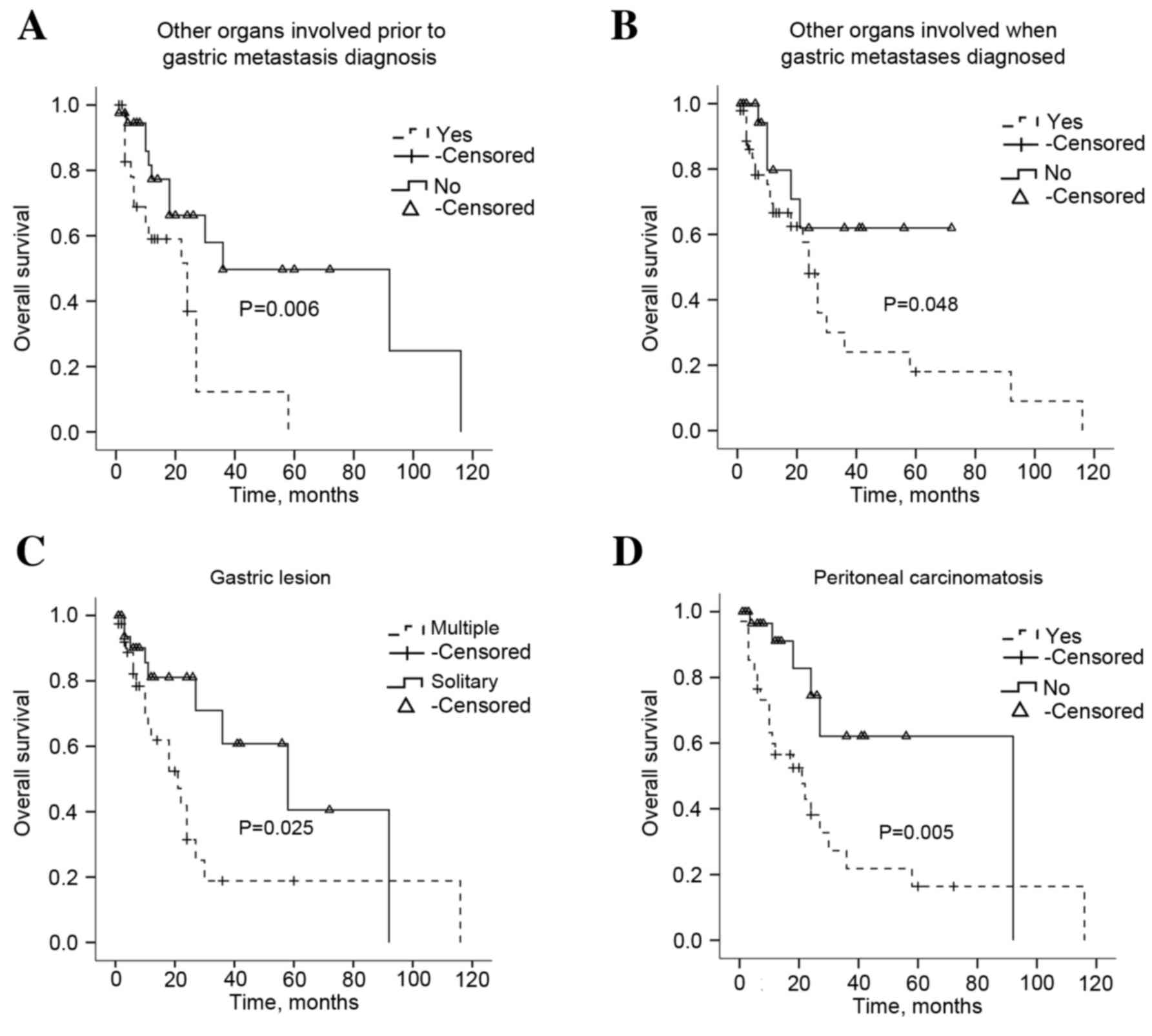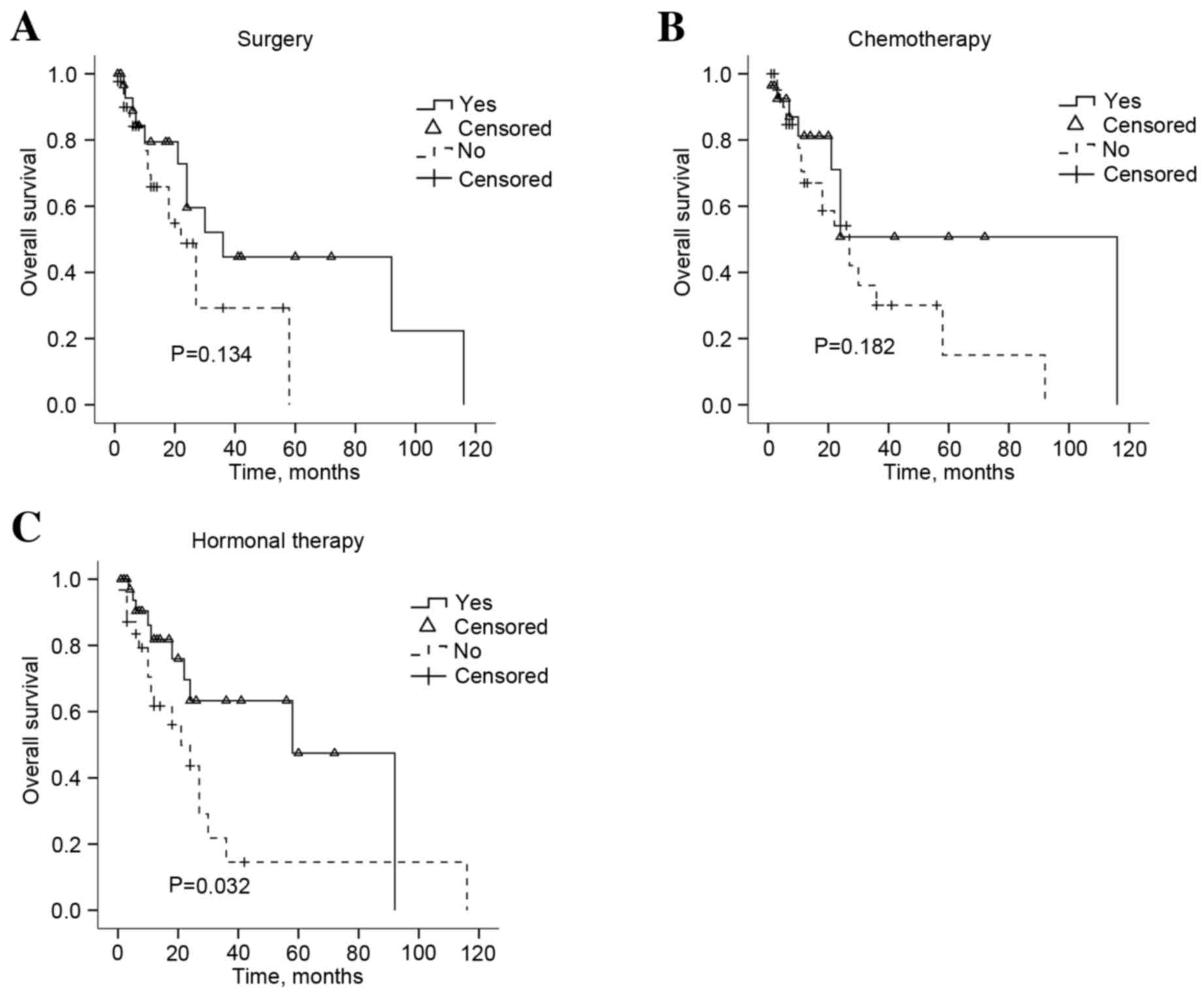|
1
|
Siegel RL, Miller KD and Jemal A: Cancer
statistics, 2015: CA Cancer J Clin. 65:5–29. 2015.
|
|
2
|
Wang H, Zhang C, Zhang J, Kong L, Zhu H
and Yu J: The prognosis analysis of different metastasis pattern in
patients with different breast cancer subtypes: A SEER based study.
Oncotarget. Dec 27–2016.(Epub ahead of print). View Article : Google Scholar
|
|
3
|
Koike K, Kitahara K, Higaki M, Urata M,
Yamazaki F and Noshiro H: Clinicopathological features of gastric
metastasis from breast cancer in three cases. Breast Cancer.
21:629–634. 2014. View Article : Google Scholar : PubMed/NCBI
|
|
4
|
Cheng L and Li X: Breast imaging reporting
and datasystem (BI-RADS) of magnetics resonance imaging: Breast
mass. Gland Surg. 1:62–74. 2012.PubMed/NCBI
|
|
5
|
Bast RC Jr, Klug TL, St John E, Jenison E,
Niloff JM, Lazarus H, Berkowitz RS, Leavitt T, Griffiths CT, Parker
L, et al: A radioimmunoassay using a monoclonal antibody to monitor
the course of epithelial ovarian cancer. N Engl J Med. 309:883–887.
1983. View Article : Google Scholar : PubMed/NCBI
|
|
6
|
Singletary SE, Allred C, Ashley P, Bassett
LW, Berry D, Bland KI, Borgen PI, Clark GM, Edge SB, Hayes DF, et
al: Staging system for breast cancer: Revisions for the 6th edition
of the AJCC cancer staging manual. Surg Clin North Am. 83:803–819.
2003. View Article : Google Scholar : PubMed/NCBI
|
|
7
|
Almubarak MM, Laé M, Cacheux W, de Cremoux
P, Pierga JY, Reyal F, Bennett SP, Falcou MC, Salmon RJ, Baranger B
and Mariani P: Gastric metastasis of breast cancer: A single centre
retrospective study. Dig Liver Dis. 43:823–827. 2011. View Article : Google Scholar : PubMed/NCBI
|
|
8
|
Abid A, Moffa C and Monga DK: Breast
cancer metastasis to the GI tract may mimic primary gastric cancer.
J Clin Oncol. 31:e106–e107. 2013. View Article : Google Scholar : PubMed/NCBI
|
|
9
|
Taal BG, Boot H, van Heerde P, de Jong D,
Hart AA and Burgers JM: Primary non-Hodgkin lymphoma of the
stomach: Endoscopic pattern and prognosis in low versus high grade
malignancy in relation to the MALT concept. Gut. 39:556–561. 1996.
View Article : Google Scholar : PubMed/NCBI
|
|
10
|
Zelek L, Cottu PH, Mignot L, de
Roquancourt A, Fizazi K, Cojean-Zelek I, Espie M and Marty M:
Gastric metastases from breast cancer: A retrospective series of 12
patients. Am J Clin Oncol. 24:363–365. 2001. View Article : Google Scholar : PubMed/NCBI
|
|
11
|
Takeuchi H, Hiroshige S, Yoshikawa Y,
Kusumoto T and Muto Y: A case of synchronous metastasis of breast
cancer to stomach and colon. Anticancer Res. 32:4051–4055.
2012.PubMed/NCBI
|
|
12
|
Taal BG, Peterse H and Boot H: Clinical
presentation, endoscopic features and treatment of gastric
metastases from breast carcinoma. Cancer. 89:2214–2221. 2000.
View Article : Google Scholar : PubMed/NCBI
|
|
13
|
Kim GH, Ahn JY, Jung HY, Park YS, Kim MJ,
Choi KD, Lee JH, Choi KS, do Kim H, Lim H, et al: Clinical and
endoscopic features of metastatic tumors in the stomach. Gut Liver.
9:615–622. 2015.PubMed/NCBI
|
|
14
|
Namikawa T and Hanazaki K:
Clinicopathological features and treatment outcomes of metastatic
tumors in the stomach. Surg Today. 44:1392–1399. 2014. View Article : Google Scholar : PubMed/NCBI
|
|
15
|
Van Trappen P, Serreyn R, Elewaut AE,
Cocquyt V and Van Belle S: Abdominal pain with anorexia in patients
with breast carcinoma. Ann Oncol. 9:1243–1245. 1998. View Article : Google Scholar : PubMed/NCBI
|
|
16
|
Schwarz RE, Klimstra DS and Turnbull AD:
Metastatic breast cancer masquerading as gastrointestinal primary.
Am J Gastroenterol. 93:111–114. 1998. View Article : Google Scholar : PubMed/NCBI
|
|
17
|
Borst MJ and Ingold JA: Metastatic
patterns of invasive lobular versus invasive ductal carcinoma of
the breast. Surgery. 114:637–642. 1993.PubMed/NCBI
|
|
18
|
Arpino G, Bardou VJ, Clark GM and Elledge
RM: Infiltrating lobular carcinoma of the breast: Tumor
characteristics and clinical outcome. Breast Cancer Res.
6:R149–R156. 2004. View
Article : Google Scholar : PubMed/NCBI
|
|
19
|
Sobinsky JD, Willson TD, Podbielski FJ and
Connolly MM: Unusual metastatic patterns of invasive lobular
carcinoma of the breast. Case Rep Oncol Med.
2013:9865172013.PubMed/NCBI
|
|
20
|
Gruel N, Lucchesi C, Raynal V, Rodrigues
MJ, Pierron G, Goudefroye R, Cottu P, Reyal F, Sastre-Garau X,
Fourquet A, et al: Lobular invasive carcinoma of the breast is a
molecular entity distinct from luminal invasive ductal carcinoma.
Eur J Cancer. 46:2399–2407. 2010. View Article : Google Scholar : PubMed/NCBI
|
|
21
|
Fernandes GS, Corrêa TS, Carvalho EP, Katz
A and Hoff PM: Gastric and endobronchial metastases in a case of
lobular breast cancer. Case Rep Oncol. 6:555–560. 2013. View Article : Google Scholar : PubMed/NCBI
|
|
22
|
Arrangoiz R, Papavasiliou P, Dushkin H and
Farma JM: Case report and literature review: Metastatic lobular
carcinoma of the breast an unusual presentation. Int J Surg Case
Rep. 2:301–305. 2011. View Article : Google Scholar : PubMed/NCBI
|
|
23
|
Bharat A, Gao F and Margenthaler JA: Tumor
characteristics and patient outcomes are similar between invasive
lobular and mixed invasive ductal/lobular breast cancers but differ
from pure invasive ductal breast cancers. Am J Surg. 198:516–519.
2009. View Article : Google Scholar : PubMed/NCBI
|
|
24
|
Pectasides D, Psyrri A, Pliarchopoulou K,
Floros T, Papaxoinis G, Skondra M, Papatsibas G, Macheras A,
Athanasas G, Arapantoni-Datioti P and Economopoulos T: Gastric
metastases originating from breast cancer: Report of 8 cases and
review of the literature. Anticancer Res. 29:4759–4763.
2009.PubMed/NCBI
|
|
25
|
Ricciuti B, Leonardi GC, Ravaioli N, De
Giglio A, Brambilla M, Prosperi E, Ribacchi F, Meacci M, Crinò L,
Maiettini D, et al: Ductal breast carcinoma metastatic to the
stomach resembling primary linitis plastica in a male patient. J
Breast Cancer. 19:324–329. 2016. View Article : Google Scholar : PubMed/NCBI
|
|
26
|
Yoshida Y: Metastases and primary
neoplasms of the stomach in patients with breast cancer. Am J Surg.
125:738–743. 1973. View Article : Google Scholar : PubMed/NCBI
|
|
27
|
Sataloff DM, Dentchev D, Henry DH and
Weese JL: Isolated breast metastases from primary gastric
adenocarcinoma. Breast J. 6:622000. View Article : Google Scholar : PubMed/NCBI
|
|
28
|
Sato T, Muto I, Fushiki M, Hasegawa M,
Hasegawa M, Sakai T and Sekiya M: Metastatic breast cancer from
gastric and ovarian cancer, mimicking inflammatory breast cancer:
Report of two cases. Breast Cancer. 15:315–320. 2008. View Article : Google Scholar : PubMed/NCBI
|
|
29
|
Sarkut P, Ozer A, Gulcu B, Ozturk E,
Gokgoz S and Ugras N: An extremely rare cause of gastric outlet:
Breast lobular carcinoma metastases to stomach. Breast J.
20:312–313. 2014. View Article : Google Scholar : PubMed/NCBI
|
|
30
|
Tot T: The role of cytokeratins 20 and 7
and estrogen receptor analysis in separation of metastatic lobular
carcinoma of the breast and metastatic signet ring cell carcinoma
of the gastrointestinal tract. APMIS. 108:467–472. 2000. View Article : Google Scholar : PubMed/NCBI
|
|
31
|
Martin V, Cappuzzo F, Mazzucchelli L and
Frattini M: HER2 in solid tumors: More than 10 years under the
microscope; where are we now? Future Oncol. 10:1469–1486. 2014.
View Article : Google Scholar : PubMed/NCBI
|
|
32
|
Brown RW, Campagna LB, Dunn JK and Cagle
PT: Immunohistochemical identification of tumor markers in
metastatic adenocarcinoma. A diagnostic adjunct in the
determination of primary site. Am J Clin Pathol. 107:12–19. 1997.
View Article : Google Scholar : PubMed/NCBI
|
|
33
|
Guarneri V, Giovannelli S, Ficarra G,
Bettelli S, Maiorana A, Piacentini F, Barbieri E, Dieci MV, D'Amico
R, Jovic G and Conte P: Comparison of HER-2 and hormone receptor
expression in primary breast cancers and asynchronous paired
metastases: Impact on patient management. Oncologist. 13:838–844.
2008. View Article : Google Scholar : PubMed/NCBI
|
|
34
|
Dassen AE, Lips DJ, Hoekstra CJ, Pruijt JF
and Bosscha K: FDG-PET has no definite role in preoperative imaging
in gastric cancer. Eur J Surg Oncol. 35:449–455. 2009. View Article : Google Scholar : PubMed/NCBI
|
|
35
|
Gadde R, Tamariz L, Hanna M, Avisar E,
Livingstone A, Franceschi D and Yakoub D: Metastatic gastric cancer
(MGC) patients: Can we improve survival by metastasectomy? A
systematic review and meta-analysis. J Surg Oncol. 112:38–45. 2015.
View Article : Google Scholar : PubMed/NCBI
|
|
36
|
Wasif N, Maggard MA, Ko CY and Giuliano
AE: Invasive lobular vs. ductal breast cancer: A stage-matched
comparison of outcomes. Ann Surg Oncol. 17:1862–1869. 2010.
View Article : Google Scholar : PubMed/NCBI
|
|
37
|
Ambroggi M, Stroppa EM, Mordenti P,
Biasini C, Zangrandi A, Michieletti E, Belloni E and Cavanna L:
Metastatic breast cancer to the gastrointestinal tract: Report of
five cases and review of the literature. Int J Breast Cancer.
2012:4390232012. View Article : Google Scholar : PubMed/NCBI
|
|
38
|
Spackman E, Rice S, Norman G, Suh DC,
Eastwood A and Palmer S: Trastuzumab for the treatment of
HER2-positive metastatic gastric cancer: A NICE single technology
appraisal. Pharmacoeconomics. 31:185–194. 2013. View Article : Google Scholar : PubMed/NCBI
|



















